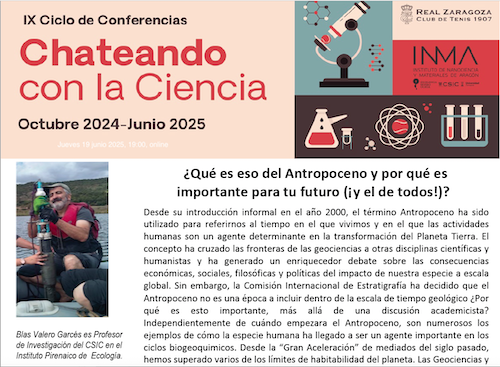
Chateando con la Ciencia: Blas Valero Garcés, from the Instituto Pirenaico de Ecología
Blas Valero Garcés, CSIC Research Professor at the Pyrenean Institute of Ecology: “What is the Anthropocene and why is it important for your future (and everyone’s!)?
Thursday, 19 June 2025, 19:00, online
To attend the videoconference, request access code to: palacio@unizar.es by 17th May.
Since its informal introduction in 2000, the term Anthropocene has been used to refer to the time in which we live and in which human activities are a determining agent in the transformation of Planet Earth. The concept has crossed the boundaries of the geosciences to other scientific and humanistic disciplines and has generated a rich debate on the economic, social, philosophical and political consequences of the impact of our species on a global scale. However, the International Commission on Stratigraphy has decided that the Anthropocene is not an epoch to be included in the geological time scale. Why is this important, beyond an academic discussion? Regardless of when the Anthropocene began, there are numerous examples of how the human species has become a major player in biogeochemical cycles. Since the ‘Great Acceleration’ in the middle of the last century, we have exceeded several of the planet’s habitability limits. Geosciences and the Anthropocene debate bring a unique temporal dimension to human knowledge: thinking in ‘geological time’ can be useful to find some answers to the current environmental crises that will determine the near future of our societies.
Blas Valero Garcés was born in the now emptied Spain (Portalrubio, Teruel, 1963) and received his PhD in Geological Sciences in 1991 (University of Zaragoza.) He was a Fulbright Fellow and Research Fellow at the Limnological Research Center, University of Minnesota, USA and is a staff researcher at the Pyrenean Institute of Ecology (CSIC) since 2000 and a research professor since 2010. His research focuses on the reconstruction of past global changes (climatic, environmental, anthropogenic) from continental records, mainly lake sequences and during the Quaternary (last 2.6 million years). He has worked in South America (Chile, Argentina, Peru), the Pacific (Easter Island), North America (USA and Mexico) and Spain. He has participated in and led international projects funded by the US-NSF, the European Commission and the International Continental Scientific Drilling Program. He was director of the Pyrenean Institute of Ecology (CSIC) (2009- 2017), Coordinator of the Group ‘Geoenvironmental Processes and Global Change’ recognized by the Diputación General de Aragón (2005- 2020) and is currently Co-Coordinator of the CSIC Connection ‘Geosciences for a Sustainable Planet’ (https://conexion-geociencias.csic.es/). In his professional career he has combined research, training, management and dissemination of science.








